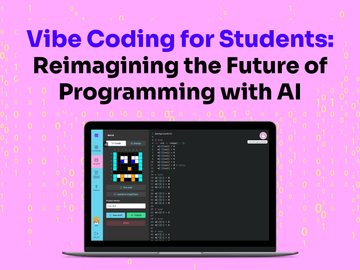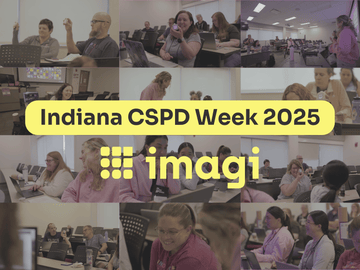
In today's rapidly evolving digital landscape, it's essential to equip all students with the skills and confidence to thrive. This is especially true for girls in STEM, a field where gender disparities still persist. Educators teaching at all-girls schools across the globe, however, are making significant strides in this area, leveraging innovative tools and approaches to empower their female students in the world of coding and beyond. In this post, we will highlight the inspiring efforts of Anna Jacinta Machado Mello, Shalim Rodriguez, and Michelle Gelbs, Ph.D, the dedicated Coding Bots team from The Chapin School in the USA, Laurie Kuchirka from Trafalgar Castle School in Canada, and Jack Walker from St George’s School in Scotland. We'll explore their backgrounds, their motivations for teaching coding to girls, their experiences with imagi tools, and the impactful outcomes they've observed in their students as a result of their work.
Anna Jacinta Machado Mello, Shalim Rodriguez, and Michelle Gelbs, Ph.D: Empowering Girls at The Chapin School

It’s important that we encourage girls to stay curious and to keep asking questions - be that in science, coding, or technology.
When the team was asked why they feel it’s important to teach coding to girls, Anna reflects on her own late introduction to coding in high school and college. “It can be intimidating in these spaces when you are an adult. So that’s why it’s important to instill confidence at a young age,” she explains. The lack of women in tech is a topic Anna often discusses with her husband, a software engineer, who also sees firsthand the need for diverse perspectives in creating new technology and solutions. Shalim highlights the stark gender disparity in tech applications, noting, for example, in a recent tech department search only a small percentage of applicants were women. He believes that women who embrace coding bring unique perspectives to the tech industry. Michelle stresses that coding teaches logic and problem-solving skills applicable across all fields. Introducing coding and other STEM areas at a young age builds foundational skills and confidence, reducing impostor syndrome and helping girls persist in the face of challenges.
When the upper school robotics coaches at Chapin saw the need for building specific coding skills in Python among their students, parents echoed this need, supporting their daughters’ interest in coding and desire to learn Python. Anna admits she didn’t know where to start teaching Python but found imagi to be an excellent starting point. imagi’s curriculum serves as a foundation for the Coding Bots Club for 5th-7th grade students to spark an interest in STEM and creativity among students. Next year, imagi will also be used by 4th-grade students who are part of the Junior Bots team.
The impact of teaching with imagi at The Chapin School has been profound, says Anna. Many girls continue logging onto the platform after hours, creating flags and animals, and sharing their work, fostering a healthy competitive spirit. Anna continues, “It was a steep curve to get through the first few lessons, but once they understand and can bring in their own creativity, it becomes more engaging.”
The team at The Chapin School is now recruiting more students for Coding Bots, with some preferring the coding aspect of robotics over building. The goal is to keep students curious and encourage them to ask questions, ensuring they don’t get discouraged and remain interested in STEM for years to come.
Laurie Kuchirka: Inspiring Future Innovators at Trafalgar Castle School

Our goals are to strengthen students' competencies and confidence to become future leaders and thriving members of society while also uplifting the presence and influence of women across industries.
With over 20 years of teaching experience, Laurie Kuchirka, the Dean of Academics at the Trafalgar School, is deeply committed to creating engaging learning environments. She believes in providing girls with the tools and contexts they need to succeed. “With the increasing prevalence of technology, students, and in particular, girls, need to leverage a variety of skills and competencies that will allow them to meet the challenges, strengths, and circumstances of their world today and in the future,” she explains.
Laurie emphasizes the importance of coding for girls, recognizing how essential computational thinking skills are in today’s digital world. Coding, she notes, not only helps students understand and engage with the world around them but also instills resilience and perseverance as they debug and iterate their code.
Laurie discovered imagi through an email and was immediately impressed by its potential. “I was drawn to the fact that it was teaching Python coding,” she says, highlighting her desire to strengthen coding skills in her Grade 7 and 8 programs. imagi’s structure, which allows both teachers to build their own coding skills and allows for students to work independently at their own pace, was a perfect fit. She appreciates the aesthetic and engaging nature of the lessons, which are designed to be appealing and easy to follow.
At Trafalgar Castle School, Laurie uses imagi in Design Thinking and Robotics classes, often integrating it twice a week for a month at a time. This approach has led to significant improvements in her students' computational thinking skills. “After teaching with imagi, students’ ability to sit with the discomfort of not immediately knowing the answer increased. They became better at thinking critically and logically, iterating their code until they found a solution,” she observes.
Jack Walker: Championing Girls in Computing at St George’s School

By engaging more girls in coding, we can widen the tech ecosystem funnel in Scotland, leading to a greater number of women working in the industry or starting tech businesses in the future. It is vital to increase female participation to ensure diversity and innovation in the tech sector.
Jack Walker is in his first year at St George’s School, an independent school for girls in Edinburgh, Scotland. He has a background in swim teaching, but is passionate about leveraging technology to enhance learning. Jack is particularly dedicated to encouraging girls to pursue computing and STEM subjects in order to address the low female participation rates in the field in Scotland and beyond.
For Jack, providing girls with engaging opportunities to learn coding is crucial. “It addresses the existing gender biases and the often uninspiring curriculum that discourages their interest,” he says. By engaging more girls in coding, Jack aims to support the expansion of the tech ecosystem funnel in Scotland, ultimately increasing the number of women in the industry or starting tech businesses.
Jack discovered imagi as an all-in-one platform designed by a team of inspirational women specifically for classroom use. He appreciates how imagi brings Python to life through fun animations and pixel art, making advanced concepts accessible and engaging for young learners. This approach aligns perfectly with his goal of making programming enjoyable and approachable for girls.
Conclusion
Educators like Anna Jacinta Machado Mello, Shalim Rodriguez, Michelle Gelbs, Ph.D, Laurie Kuchirka, and Jack Walker are making a profound impact by empowering girls in STEM. Through their dedication, passion, innovative teaching methods, they are helping to break down barriers and create a more diverse and inclusive tech industry. As we celebrate these educators and their work, we look forward to a future where girls are equally represented and thriving in all STEM fields.




